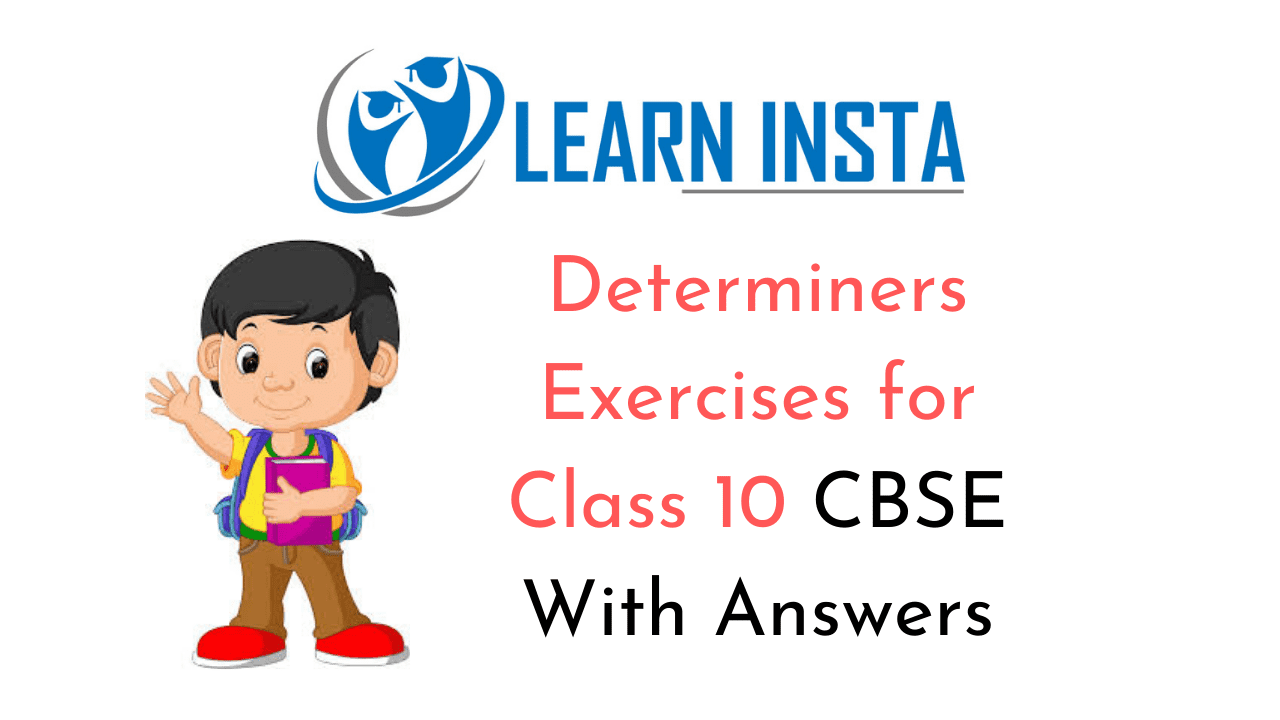
Determiners are words placed before nouns or pronouns to decide or fix their meaning. They tell us ‘how many’ or ‘how much’. Determiners are words which come before nouns. They contain several classes of words, including pronouns and adjectives. They determine or limit the noun by giving some additional information about it. Determiners show whether a noun refers to is a general or a specific object, person or place. They indicate which or how many things the noun refers to. Determiners define or limit a noun to the singular or plural. They indicate amount or quantity. Determiners and nouns together make noun phrases. They make noun phrases with adjectives too. Determiners may precede numerals too.
This grammar section explains English Grammar in a clear and simple way. There are example sentences to show how the language is used. NCERT Solutions for Class 10 English will help you to write better answers in your Class 10 exams. Because the Solutions are solved by subject matter experts.
Determiners Exercises for Class 10 CBSE With Answers PDF
Determiners are words that precede and modify nouns. They tell us how many or how much. Selecting the correct determiner depends on your understanding of the distinction between countable and uncountable nouns.
Countable Nouns
Countable nouns refer to things that we can count. Such nouns can take either singular or plural form. Concrete nouns may be countable.
Examples:
- There are a dozen apples in the basket.
- He ate an egg for breakfast.
Collective nouns are countable.
Examples:
- We saw a herd of elephants in the forest yesterday.
- Paris is home to several orchestras.
Uncountable Nouns
Uncountable nouns refer to things that we cannot count. Such nouns take only singular form. Abstract nouns are uncountable.
Examples:
- The price of freedom is constant vigilance.
- Her writing shows maturity and intelligence.
Some concrete nouns are uncountable (when understood in their undivided sense).
Examples:
- The price of oil is rising constantly.
- Would you like some rice?
While uncountable nouns do not generally take a plural form, sometimes they may be pluralised when used in a countable sense. The difference between the uncountable and countable meanings of nouns that are used in either sense can be seen in the following table:
| Uncountable Sense | Countable Sense |
| Art is often called an imitation of life. | I read a book about the folk arts of Bengal. |
| Life is precious. | A cat has nine lives. |
| They like to eat pizza. | How many pizzas have you eaten? |
| Religion has often been used to divide people. | India is a country of many religions. |
| She has always had beautiful skin. | The cavemen dressed in animal skins. |
| She uses only recycled paper to write letters. | Have you filed in your nomination papers? |
Determiners Solved Exercise With Answers for Class 10 CBSE
Fill in the blanks using suitable determiners.
(a) …………………………….. (a/an/the) man went for (b) …………………………….. (a/an/the) holiday to (c) …………………………….. (a/an/the) place near (d) …………………………….. (a/an/the) sea., (e) …………………………….. (every/all/some) morning he went for a swim in the sea. On (f) …………………………….. (all/most/every) days the sea was rough, but on (g) …………………………….. (every/most/some) days it was calm.
Answer:
(a) a
(b) a
(c) a
(d) the
(e) every
(f) most
(g) some
Read the following paragraphs and fill in the blanks with the appropriate determiner.
Question 2.
Savita has lost the (a) …………………………. pens she had. Now she has spent the (b) …………………………. money she had on buying more. So she is giving (c) …………………………. worried look.
Answer:
(a) few
(b) little
(c) a
Question 3.
There are so (a) …………………………. ways of entertainment in life. (b) …………………………. circus is one of the most entertaining media. Last Sunday (c) …………………………. of (d) …………………………. friends went to see the Diamond Circus. My uncle took us there. (e) …………………………. one paid for (f) …………………………. ticket.
Answer:
(a) many
(b) The
(c) some
(d) our
(e) Every
(f) his
Question 4.
(a) …………………………. is one of (b) …………………………. most memorable trips. At Rameshwaram we saw (c) …………………………. ancient temples, which gave (d) …………………………. idea of our glorious past. It added (e) …………………………. to (f) …………………………. knowledge.
Answer:
(a) This
(b) the
(c) a few
(d) some
(e) a lot
(f) our
Question 5.
Sahil: Meet him, (a) …………………………. is (b) …………………………. brother.
Rohan: You resemble (c) …………………………. (d) ………………………….
Sahil: No, you are wrong, (e) …………………………. of us resembles.
In fact, there is hardly (f) …………………………. resemblance.
Answer:
(a) he
(b) my
(c) each
(d) Other
(e) neither m any
Question 6.
Mukna Kangjei is (a) …………………………. very popular game in Manipur. It enjoyed (b) …………………………. royal patronage in (c) …………………………. olden days. Manipur is known for several games that developed over (d) …………………………. period of time. It is (e) …………………………. indigenous game. In the beginning, it was very popular but now slowly (f) …………………………. game is fading away.
Answer:
(a) a
(b) the
(c) the
(d) a
(e) an
(f) the
Question 7.
The interact club of ABC Public School recently organised (a) …………………………. voluntary blood donation …………………………. event was (c) …………………………. initiative of (d) …………………………. Rotary Club of Delhi. As (e) …………………………. part of the drive (f) …………………………. students took out a rally in the vicinity of the school.
Answer:
(a) a
(b) The
(c) an
(d) the
(e) a
(f) the